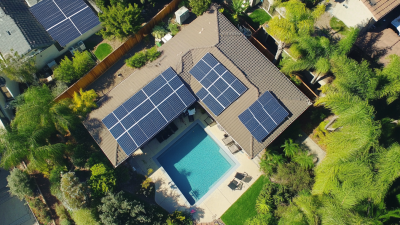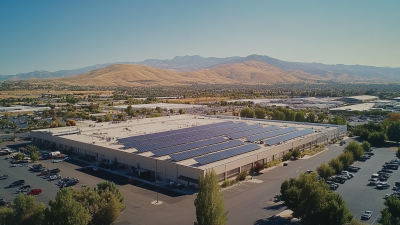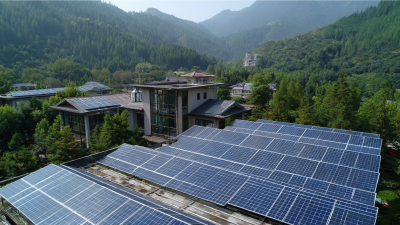Blog
- Home
- Blog
Exploring Alternative Energy Solutions with Residential Solar Panels for Sustainable Living
As the world grapples with the pressing need for sustainable energy solutions, residential solar panels are emerging as a pivotal component of the transition towards a greener future. According to the International Energy Agency (IEA), solar energy could account for nearly 20% of global electricity generation by 2040, marking a significant shift in how we harness renewable resources. The adoption of residential solar panels not only reduces dependence on fossil fuels but also empowers homeowners to take control of their energy production. With technological advancements driving the cost of solar installations down by approximately 89% since 2009, coupled with federal incentives, the residential solar market is projected to grow exponentially. This blog explores the multitude of benefits and innovations surrounding residential solar panels, highlighting their role in promoting sustainable living and fostering energy independence in the face of climate change.

Key Advantages of Residential Solar Panels in Energy Independence
Residential solar panels have emerged as a pivotal solution for homeowners seeking energy independence. By harnessing the sun’s abundant energy, families can significantly reduce their reliance on traditional power grids. This transition not only delivers financial savings by lowering electricity bills but also offers protection against rising energy costs. With advancements in technology, solar panels have become more efficient and accessible, making them a practical choice for sustainable living.
Another key advantage of residential solar panels is their positive environmental impact. By generating clean, renewable energy, homeowners actively contribute to reducing carbon footprints and combating climate change. This choice fosters a sustainable lifestyle that prioritizes long-term ecological health.
Moreover, many governments incentivize solar panel installations through tax credits and rebates, further enhancing the economic viability of this green energy solution. Embracing solar energy not only empowers individuals to take control of their energy usage but also supports the broader movement toward a cleaner, more sustainable future.
Financial Savings Through Solar Energy: A Cost-Benefit Analysis
The transition to solar energy is not just an environmentally friendly choice; it’s also a financially savvy decision for homeowners. By installing residential solar panels, homeowners can harness the power of the sun to significantly reduce their electricity bills. A cost-benefit analysis reveals that the initial investment in solar technology can lead to substantial long-term savings.
Typically, the payback period ranges from 5 to 10 years, depending on the size of the system and local energy costs. After this period, homeowners enjoy years of virtually free energy.
Moreover, government incentives such as tax credits and rebates further enhance the financial appeal of solar panels. These programs can cover a large portion of the upfront costs, making solar energy more accessible for many households.
As energy prices continue to rise, investing in solar not only protects homeowners from fluctuating electricity rates but can also increase property value. With numerous financial benefits paired with the positive environmental impact, solar energy emerges as a compelling alternative for sustainable living.

Environmental Impact: Reducing Your Carbon Footprint with Solar Power
Harnessing solar power for residential use not only provides significant cost savings but also plays a crucial role in reducing your carbon footprint. By transitioning to solar energy, homeowners can decrease their reliance on fossil fuels, which are the primary contributors to greenhouse gas emissions. Every kilowatt-hour of solar energy generated translates into fewer emissions released into the atmosphere, making a considerable impact on combating climate change.
To maximize the environmental benefits of solar panels, consider the following tips. First, conduct an energy audit of your home to assess your power consumption. Understanding where energy is used can help you optimize solar energy use and identify areas for improvement, like upgrading to energy-efficient appliances. Second, combine your solar power system with energy storage solutions. Batteries allow you to store excess energy generated during sunny days, ensuring you can maintain your green lifestyle even when sunlight is scarce.
Additionally, think about participating in local solar programs or community solar initiatives. These programs not only promote the adoption of renewable energy but also foster a collective effort in reducing carbon emissions. By sharing resources and information, you can contribute to a larger impact while building a supportive community focused on sustainable living.

Increasing Property Value: How Solar Panels Enhance Home Equity
Installing residential solar panels not only contributes to a sustainable future but also significantly enhances property value. Homeowners who invest in solar energy systems are often rewarded with increased equity, as these installations make homes more attractive to potential buyers. Solar panels symbolize modernity and eco-friendliness, appealing particularly to environmentally conscious consumers. In fact, studies have shown that homes equipped with solar energy systems can sell for a premium compared to similar homes without solar.
Moreover, the long-term financial benefits of solar panels extend beyond immediate property value appreciation. Homeowners can benefit from reduced energy costs, tax incentives, and potential rebates, translating to substantial savings over time. As energy prices continue to rise, the ability to generate one's own electricity becomes increasingly compelling. The combination of lower utility bills and enhanced home equity makes solar panels an excellent investment for homeowners looking to secure their financial future while promoting environmental responsibility.
Impact of Solar Panels on Property Value
Incentives and Rebates: Government Support for Solar Energy Adoption
Government support plays a pivotal role in promoting the adoption of solar energy, particularly for residential homeowners looking to invest in solar panels. According to the Solar Energy Industries Association (SEIA), over 3 million residential solar systems were installed across the United States by the end of 2022. Incentives such as the federal solar investment tax credit (ITC), which allows homeowners to deduct 26% of the installation costs from their federal taxes, have significantly accelerated this growth. With estimates suggesting that this incentive could save an average homeowner around $9,000 over the lifespan of their solar system, financial feasibility becomes a compelling reason to go solar.
In addition to the federal incentives, many states offer their own rebates and programs, further reducing the overall cost of installation. A report by the National Renewable Energy Laboratory (NREL) indicates that, when considering state-level incentives, homeowners could see an average reduction of approximately 30-50% in their upfront installation costs. This strategic approach not only fosters a shift towards sustainable energy practices but also supports local economies by creating jobs in the solar sector, which saw over 250,000 workers employed in 2022 alone. As government initiatives continue to evolve, the pathway for residential solar adoption remains brighter than ever.
Exploring Alternative Energy Solutions with Residential Solar Panels for Sustainable Living - Incentives and Rebates: Government Support for Solar Energy Adoption
| Incentive Type | Description | Estimated Savings ($) | Eligibility Criteria |
|---|---|---|---|
| Federal Tax Credit | A credit on federal income taxes for installing solar systems. | Up to $7,000 | Homeowners with solar panels installed. |
| State-level Rebates | Cash rebates provided by state governments for solar installations. | $1,000 - $5,000 | Varies by state regulations. |
| Solar Renewable Energy Certificates (SRECs) | Payments for producing solar energy, typically issued by states. | $10 - $300 per SREC | Must be connected to the grid and registered in the state program. |
| Property Tax Exemptions | Exemptions from property tax increases resulting from solar installations. | Varies by location | Homeowners installing solar panels on residential properties. |
| Net Metering | System that credits solar energy system owners for the electricity they add to the grid. | Variable, depends on usage | Homes with grid-tied solar systems. |
Related Posts
-

Global Insights on Residential Solar Panels Market by 2025 Trends Data and Strategies for Success
-

Chinese Excellence in Solar Technology Crafting the Best Residential Solar Systems
-

Unlocking the Future of Power Solar Energy Your Comprehensive Purchasing Guide
-

Exploring the Versatile Features and Applications of Best Power Solar Products
-

Maximizing Supply Chain Efficiency with Renewable Solar Energy Solutions for Global Buyers
-

Elevate Your Energy Solutions with China's Premium Quality Small Solar Panels for Global Markets